Protecting the Global Marine Environment
EPA Efforts to Address the Global Marine Litter Problem
EPA is working to address marine litter globally through international policy engagement and international actions and projects. To reduce and prevent marine litter, EPA has developed an International Marine Litter Toolbox that includes guides for countries to use in addressing marine litter and improving solid waste management. EPA helps shape U.S. Government positions on international marine pollution issues with U.S. government agency partners, national governments in other countries, and international organizations, among others, to ensure that international decisions and management of marine pollution issues support EPA's mission: To protect human health and to safeguard the natural environment - air, water, and land -upon which life depends.
Learn more about EPA efforts to protect the global marine environment:
- International Policy Engagement on Marine Litter
- EPA's International Projects to Reduce and Prevent Marine Litter
- Reducing Pollution from Ships
- London Convention and London Protocol
- Additional Information
- Contacts
International Policy Engagement on Marine Litter
Marine litter is a top agenda item in multilateral policy fora across the globe. EPA participates and leads in international multilateral policy fora to advance EPA marine litter policies and programs.
See below for information on the various multilateral policy fora where EPA engages on marine litter.
Development of Global Legally Binding Instrument on Plastic Pollution
The United Nations Environment Assembly (UNEA) is the highest-level decision-making body on the environment in the United Nations system. Several resolutions have been passed under UNEA that address marine litter. The Fifth session of the UN Environment Assembly (UNEA 5.2) historically launched an Intergovernmental Negotiating Committee (INC) to develop an international legally binding instrument on plastic pollution, including in the marine environment, with the ambition of completing its work by the end of 2024, (UNEA Resolution 5/14 ). The work of the INC is facilitated by a Secretariat hosted by the UN Environment Program (UNEP).
EPA works closely with its interagency and international partners to provide expertise on prevention and management of plastic pollution. EPA plays a critical role as part of the U.S. delegation to the INCs and is actively involved in the negotiations to develop this new global instrument.
The INC schedule aims to conclude negotiations by the end of 2024. For more information on the INC, please visit Secretariat’s website.
Land-Based Sources Protocol to the Cartagena Convention
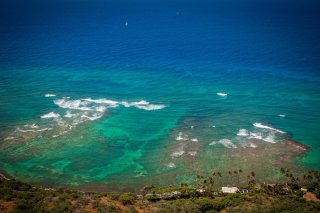
The U.S. is party to the Protocol Concerning Pollution from Land-Based Sources and Activities (LBS Protocol), which was signed in 1999 in Aruba, Netherlands Antilles, and entered into force in 2010 at the Conference of the Parties (COP) for the Cartagena Convention. The LBS Protocol is a legally binding protocol to the Cartagena Convention, and incorporates general obligations to address land-based sources of pollution in the Wider Caribbean, including marine litter.
The Wider Caribbean Region includes those countries that border:
- eastern Florida south of 30 north latitude,
- the Straits of Florida,
- the Gulf of Mexico or
- the Caribbean Sea.
EPA is the U.S. government technical focal point for the implementation of the LBS Protocol, which focuses on two key issues: domestic sewage (wastewater) and agricultural non-point source (nutrient) pollution.
In addition to staff in Washington, DC, EPA staff in the Caribbean Environmental Protection Division provide expertise and coordination with countries of the Wider Caribbean Region. The Office of International and Tribal Affairs also coordinates with experts in EPA's Gulf of Mexico Program on pollution prevention issues.
For further information on EPA's involvement with the LBS Protocol, see Cartagena Convention and Caribbean Environment Program.
Our Ocean Conference
The Our Ocean Conference (OOC) began in 2015 as a U.S. initiative to bring together representatives from governments, the private sector, civil society, and academia - all from across the globe - to engage in cooperative discussion and commit to concrete actions necessary to support the future of a healthy ocean and climate. To learn more about the history of the Our Ocean Conference, as well as the United States’ involvement, please visit the Department of State’s OOC webpage.
During the 2023 Our Ocean Conference hosted by Panama, focus was placed on six areas of action: promoting marine protected areas, fostering a sustainable blue economy, tackling the climate crisis, supporting maritime security, advancing sustainable fisheries, and combating marine pollution. EPA committed USD 140 million in improvements to recycling infrastructure to reduce land-based sources of plastic waste to the marine environment. Under the Bipartisan Infrastructure Law, EPA also committed its intent to spend USD 1.7 billion to restore ecosystems, increase community and habitat resilience, and employ nature-based solutions to prevent and clean up nutrient and other pollution across some of the nation's most essential, beloved, and populated watersheds. The United States made 77 announcements, from eight agencies and offices, worth nearly USD 6 billion.
Global Partnership on Marine Litter
The U.S. is a member of the voluntary Global Partnership on Marine Litter (GPML). The GPML is a multi-stakeholder partnership organized through the UN Environment Program (UNEP) which brings together all the actors working on marine litter prevention and reduction. EPA participates in the GPML to share expertise on policies and programs to help countries address their marine litter challenges.
Plastic Waste Partnership under Basel Convention
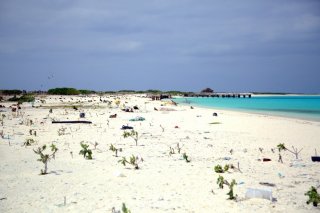
EPA is a member of the Basel Plastic Waste Partnership (PWP) which was established at the 14th Conference of the Parties of the Basel Convention in 2019. The objective of the PWP is to improve and promote the environmentally sound management of plastic waste at the global, regional and national levels and prevent and minimize their generation so as to, among other things, reduce significantly and in the long-term eliminate the discharge of plastic waste and microplastics into the environment, in particular, the marine environment. To learn more about the PWP, visit their website.
EPA's International Projects to Reduce and Prevent Marine Litter
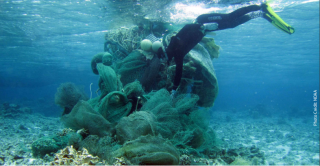
EPA works bilaterally and multilaterally across the globe to implement projects that reduce and prevent land-based sources of marine litter. Some of our efforts focus on bilateral technical assistance to improve solid waste management in various countries. Projects have focused on improving waste collection in communities with scarce collection or through inclusion and formalization of the informal waste sector. Most of EPA’s projects addressing marine litter have been through our international Trash Free Waters initiatives.
Trash Free Waters International
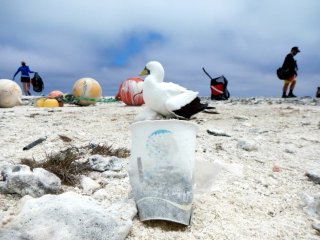
EPA’s international projects to address marine litter are based on Trash Free Waters (TFW) – EPA’s strategic, stakeholder-based approach to address marine litter through improvements in solid waste management and prioritizing community needs. TFW can be implemented as a national program or at the local level within communities along a coast or further upstream in the watershed. TFW works by bringing together stakeholders to identify and prioritize projects that prevent and reduce litter from entering waterways and eventually the ocean. TFW projects can range from raising public awareness on sources and types of marine litter to installation of litter capture devices or improvements to solid waste management.
Many countries face challenges that are impeding efforts to address marine litter. EPA’s international TFW efforts have demonstrated that countries face challenges, including:
- Understanding national ministry roles to address marine litter and solid waste management
- Difficulty in addressing gaps or inadequacies in policies and enforcement
- Limited resources
- High leadership turnover on the issue
EPA promotes TFW internationally as a model for countries to address these challenges and better manage their land-based sources of marine litter. See below for more information on EPA’s international TFW initiatives.
Prevention and Mitigation of Plastic Pollution
EPA partnered with UNEP’s Coordinating Body for the Seas of East Asia (COBSEA) to fund and oversee the implementation of three community-based integrated waste management projects in Malaysia and Indonesia. These projects incorporate inclusive waste management practices and help to reduce land-based sources of marine litter. The projects were completed in September 2022 and are described in more detail below:
Malaysia
- In the Mersing Island archipelago, a small waste transfer and recycling facility was established to help local households increase the recovery of plastics. This project leveraged existing work from the NGO Reef Check and helped to increase recovery of recyclables, procure waste bins, and raise public awareness through a partnership with local resorts. Local stakeholders were also trained to segregate and collect waste at the household-level and at nearby resorts.
Indonesia
- In Makassar City, the World Wildlife Fund enhanced existing operations of a community-based materials recovery facility in an Indonesian fishing village. This project involved adding waste bank units to the city and trained users on how to maintain and operate these units.
- EPA and COBSEA funded a social enterprise startup that both empowers women and creates plastic waste valorization in Untia, Makassar, Indonesia. The women were trained and equipped with skills needed to create products made from plastic waste – such as tote bags and other items. The proceeds from these sales also help to support their children’s education and household needs.
Trash Free Waters in Latin America and the Caribbean
Since 2016, EPA has worked with governments and other partners in Latin American and the Caribbean to address their marine litter issues through EPA’s Trash Free Waters approach. A summary of some of those key projects below:
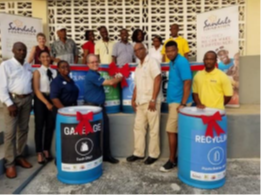
Jamaica
- Project: The project in Whitehouse-Bluefields community focused on establishing a program for waste collection and separation. The project accelerated community action through the establishment of collection sites, which included the strategic placement of waste bins to improve recycling and awareness.
- Partners: United Nations Caribbean Environment Program; Sandals Foundation; Peace Corps Jamaica
- Funding: EPA – $25K; Sandals Foundation – $5K; Leveraged Funds: $700K for a UN Environment Program multi-year plastics initiative
- Metrics: 200 bins labelled and placed; 34 collection locations established; 20 outreach activities conducted
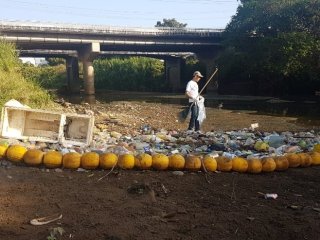
Panama
- Project: The project in Panama City focused on raising public awareness and installed trash capture booms on Juan Diaz River, where trash initially collected from the booms was transferred to a local recycling center for bailing/processing. The project also developed educational tools for local schools and community organizations on the impacts of marine litter and plastics in the environment.
- Partners: United Nations Environment Program; Ministry of Environment Panama; ANCON (NGO)
- Funding: EPA – $25K
- Metrics: 5 environmental education and outreach campaigns conducted in schools; 2 commercial facilities trained in waste separation and recycling; 2 trash capture devices installed; 7 neighborhoods sensitized to project and river booms
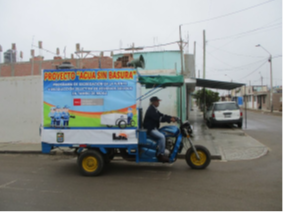
Peru
- Project: The project focused on job training in two communities within the municipality of Chincha for informal waste pickers and improved the connection between waste pickers and a regional recycling facility. As part of the formalization effort, our partner, Ciudad Saludable, implemented a source segregation and selective collection program that was expanded and now includes alliances with recycling associations. The project also identified litter leakage hot spots for Chincha to help prioritize removal efforts.
- Partners: Ministry of Environment Peru; U.S. Embassy Peru; Ica Regional Government; Ciudad Saludable (NGO); Coca-Cola
- Funding: EPA – $75K; Leveraged Funds: Coca-Cola -$300K; USAID - $300K used to construct an additional regional collection facility for recyclable material
- Metrics: 2 regional job trainings to formalize and register waste pickers; 16 hot spot sites identified, and a plan for regular waste removal
Central America
EPA is currently working with a selected group of CAFTA-DR countries (Costa Rica, Guatemala, El Salvador, and Dominican Republic) and Panama on the solid waste management and marine litter nexus and how stakeholders can collaborate to ensure initiatives in both areas are better coordinated and complementary of each other.
Through an interagency agreement with the Department of State, EPA worked with the national governments of Panama, Costa Rica, and the Dominican Republic to engage all stakeholders in identifying solutions to the marine litter problem through improvements in solid waste management. Activities included virtual national dialogues, assisting in their development of national action plans for marine litter, and on-the-ground projects that support the countries’ own efforts. National action plans were completed in Costa Rica (2021), Panama (2022), and the Dominican Republic (2023). In addition, EPA used appropriated funds to support the development of national action plans for marine litter in El Salvador (completed in 2022) and Guatemala (to be completed in 2023). The EPA completed all 3 planned workshops on landfill management in Panama, Costa Rica, and the Dominican Republic in late summer 2021 and in 2022 conducted a sub-regional workshop in Central America Northern Triangle (El Salvador, Honduras and Guatemala).
Learn more about Marine Litter in Capacity-Building Programs Under the Dominican Republic-Central America-United States Free Trade Agreement (CAFTA-DR).
North America
EPA works with the Commission for Environmental Cooperation (CEC), along with the governments of Mexico and Canada, to implement marine litter mitigation efforts in North American border watersheds, specifically the Salish Sea region and Tijuana River tributaries. EPA participates in the Steering Committee with a focus on bringing together stakeholders in border watersheds to identify and prioritize marine litter reduction projects. The “Last Stop: the Ocean” campaign is being launched to raise public awareness about the flow of litter downstream to the ocean. Materials have been designed to create awareness on water and trash flows and provide simple solutions for individuals to prevent and reduce land-based marine litter. This campaign was developed by the CEC in collaboration with Environment and Climate Change Canada (ECCC), Mexico's Secretaría de Medio Ambiente y Recursos Naturales (SEMARNAT), and the EPA, as part of a trinational collaborative project on building solutions to reduce marine litter.
Looking for more resources? The Reducing Marine Litter Through Local Action: A Toolkit for Community Engagement targets inland urban areas and communities and focuses on water and trash flow, the full life cycle of a product, and concrete actions that offer individual solutions. You can also learn more about the CEC project and its community solutions for reducing marine litter.
EPA's International Tools for Addressing Land-Based Sources of Pollution
- Solid Waste Management Toolkit for Developing Countries
- Trash Free Waters International Implementation Guide
- Proven Practice Guide to Improve Waste Management and Address Plastic Pollution in Southeast Asia
Reducing Pollution from Ships
Antifouling Paints
EPA's Office of International and Tribal Affairs (OITA) led an interagency working group negotiating U.S. policy and then helped negotiate on behalf of the U.S. for the global antifouling treaty that was developed at the International Maritime Organization (IMO). The treaty was completed in October 2001 and legally entered into force in 2008.
Additional information is available on Antifouling Systems section the official website of the IMO.
Air Pollution
EPA is leading U.S. Government efforts to address air pollution from ships including discussions at the International Maritime Organization (IMO) relating to MARPOL 73/78 Annex VI and greenhouse gas emissions from ships. EPA coordinates closely with the State Department’s climate office and the U.S. Coast Guard.
For more information on this topic, visit the Clean Air in Shipping section of the official website of the IMO.
London Convention and London Protocol
The Convention on the Prevention of Marine Pollution by Dumping of Wastes and Other Matter (commonly referred to as the London Convention) was signed in London in 1972. The United States is a Contracting Party to the London Convention, and the Marine Protection, Research and Sanctuaries Act implements the requirements of the London Convention in the United States.
The London Convention addresses the deliberate disposal at sea of wastes or other matter from vessels, aircraft, platforms and other man-made structures at sea, as well as to the deliberate disposal at sea of vessels, aircraft, platforms or other man-made structures themselves. Contracting Parties to the London Convention agreed to control dumping by implementing regulatory programs to assess the need for, and the potential impact of, dumping. The London Convention requires that Contracting Parties issue a permit for the dumping of wastes and other matter at sea and generally prohibits the dumping of certain hazardous materials.
Article I of the London Convention states:
Contracting Parties shall individually and collectively promote the effective control of all sources of pollution of the marine environment, and pledge themselves especially to take all practicable steps to prevent the pollution of the sea by the dumping of waste and other matter that is liable to create hazards to human health, to harm living resources and marine life, to damage amenities or to interfere with other legitimate uses of the sea.
In 1996, Contracting Parties to the London Convention concluded negotiations toward a new, free-standing treaty, referred to as the London Protocol, to modernize and eventually replace the London Convention. The London Protocol entered into force in 2006. The United States signed the London Protocol in 1998 but has not ratified the treaty. Article II of the London Protocol defines the objectives of this amendment as:
Contracting Parties shall individually and collectively protect and preserve the marine environment from all sources of pollution and take effective measures, according to their scientific, technical and economic capabilities, to prevent, reduce and where practicable eliminate pollution caused by dumping or incineration at sea of wastes or other matter. Where appropriate, they shall harmonize their policies in this regard.
Additional information on EPA's involvement with the London Convention.
Additional Information
Coral Reefs
EPA's Office of Wetlands, Oceans and Watersheds is the primary office working on coral reef protection issues, including through involvement with the U.S. Coral Reef Task Force (USCRTF) and the International Coral Reef Initiative (ICRI).
Arctic Marine Environment
EPA works on marine protection in the Arctic through the Arctic Council and its working groups, as well as through the negotiation of the IMO’s mandatory code for ships operating in polar waters (the Polar Code).
To learn more about marine and other activities in the Arctic, visit our Arctic Council site and explore the Polar Code in our International Maritime Organization site.
Contacts
For additional information on EPA's work protecting the global marine environment, contact:
Toni Harmer
U.S. Environmental Protection Agency
Office of International and Tribal Affairs
1300 Pennsylvania Ave., NW
Washington, DC 20460
E-mail: [email protected]
(202) 564-6600
